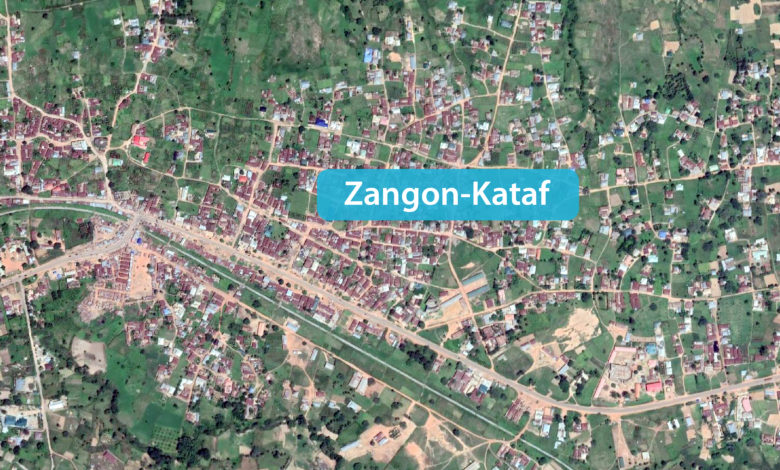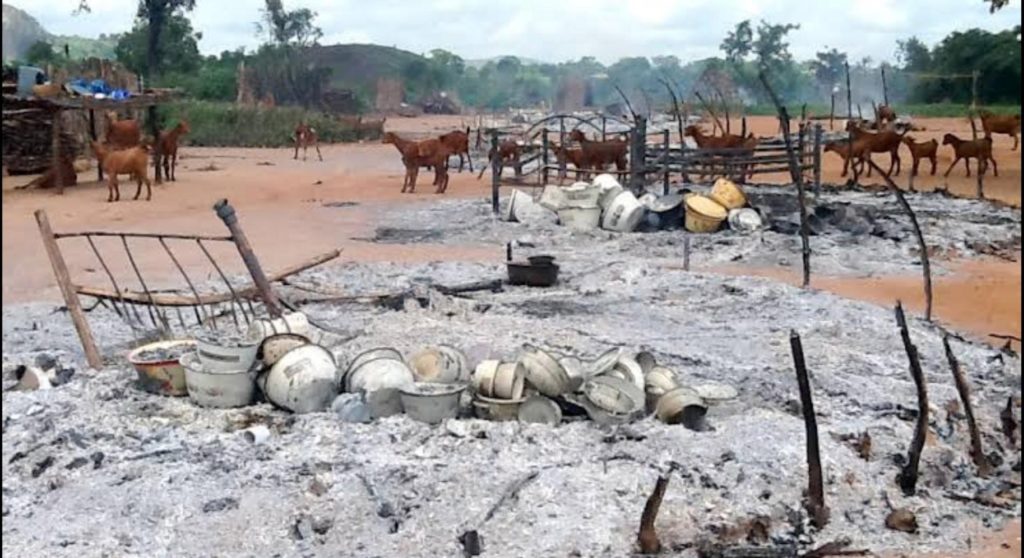8,000 Kraals Lost To The Conflicts In Southern Kaduna (Part Two)

For Ardo Haruna, grappling with the challenges of founding a new pastoral community and developing new kraals (traditional villages of huts) in a society away from home is as debilitating as the hardship caused by displacement from home.
This situation is especially compounded by the severe trauma of the loss of once-prosperous kraals back home.
For nine years, the prominent pastoralist has struggled to persevere in the face of anguish inflicted on him and his growing community of herders, displaced by the recurring communal conflicts afflicting the southern region of Kaduna State since the late 1980s.
For the pastoral Fulani, the life and wellbeing of his cattle is the extension of his life and personality.
Anything that adversely affects the normal daily routine of sustaining the life and wellbeing of the herd can strip him naked of the personality that has been his sole pride over the years.
Haruna lost a huge population of cattle to the 2011 conflict which chased him and the entire population of his community from their home, Jankasa, in Zangon-Kataf Local Government Area, to neighbouring Lere Local Government Area where they have since been struggling to found a secure Tilden Kargiji. Alongside several other neighbouring pastoral communities, they are trying to erect new kraals and breed new herds.
Having had a huge population of his cattle killed in the conflict of nearly a decade ago, the twin adversities of hunger and lack of drinking water at Tilden Kargiji now gnaw deep and fast at the herd he fled with. The community leader watches helplessly as his wealthy past sinks further and further into history.
The Southern Kaduna farmer-herder conflicts, especially over the last 10 years, have massively destroyed one of the two pillars of the region’s economy: the livestock sector.
Attacks, reprisals and counter-reprisals have led to the loss of throngs of livestock, especially cattle, through killing, rustling, challenges encountered during flight from conflict zones, and fresh challenges encountered at new settlements.
A source at the National Emergency Management Agency told HumAngle that between 1987 and 2020, about 8,000 kraals had been destroyed by the farmer-herder and other communal clashes across the region, especially in Zangon-Kataf, Kajuru, Kaura, Jama’a and Kauru local government areas.
A prominent community leader in the region, however, does not see this figure as practical, describing it as outrageous.
“Practically consider the terrain and the possibility of having even 3,000 rugas (pastoral communities) existing there over the years,” he said, querying, “Is that obtainable, if we are committed to the truth about the situation?
“Considering how kraals spring up across the region traversed or domiciled by the herdsmen, I can only see half of that number, or even something in the region of a couple of thousands, to even include the Chukun/Birnin Gwari axis, and this is even highly contestable.”
Dependable sources estimate that well over a million cattle were lost in the region in the last 23 years through killing, rustling, migration occasioned by flight from locations of conflict and slaughtering for the meat to be sold by the pastoralists themselves to cushion the effect of the emerging hardships and challenges bred by the conflicts.
According to Haruna, about 70 per cent of Southern Kaduna’s cattle have been lost to violent conflicts over the decades.
Most of the displaced herder-survivors of the clashes, according to HumAngle findings, migrate to locations lacking enough pasture and drinking water for nutritious livestock grazing areas.
Consequently, livestock reproduction diminishes, resulting in drastic reduction in cattle and other livestock population in the region and, by extension, the larger Northern Nigeria.
No source can dependably give the percentage of replenishment of lost cattle population, owing, especially, to the alleged absence of government intervention in terms of comprehensive stocktaking and cost-counting with regard to violent conflicts.
“Our displacement from Jankasa (in Zangon-Kataf Local Government Area) to Tilden Kargiji (Lere Local Government Area) has plunged us into severe hardships in terms of cattle rearing,” Haruna told HumAngle.
“Our cattle have been dying due to lack of pasture, drinking points and medicine,” he explained, pathetically, stressing, “and we watch helplessly as they die because we cannot return to Zangon-Kataf.”
Haruna said Tilden Kargiji and a few other mushrooming pastoral communities developing their kraals had been growing due to a gradual convergence of his kinsmen from Zango over the years.
Alhaji Idris Masara was also chased out of Jankasa by the Zangon-Kataf clash.
The once wealthy kraal-owner is now the leader of the Southern Kaduna pastoralist-IDPs at Zaranda in Toro Local Government Area of Bauchi State.
“The clashes have drastically reduced cattle population and are also adversely affecting cattle rearing,” he said. “I lost 47 heads of cattle while other members of my family lost a total of 200 to the conflict last year alone.”
Abdallah Ismail Abdallah, who fled from Samaru-Kataf clash and now resides at Kafanchan, told HumAngle that “whenever any conflict erupts between him and farmers, the cattle are the first victims”. Overnight, all his cattle get killed, he said.
Abdallah recalled: “Many a pastoralist in Southern Kaduna that used to have over 1,000 heads of cattle in the 1990s now has just about 100 or even less. There are many herdsmen who individually used to have 500 to 600 heads of cattle now having no cattle at all.”
All, according to him, have been lost to conflicts.
He appealed to the government to extend the support it had been rendering to farmers affected by the conflicts to herders to enable them to replenish their ranches and restore the livestock sector to its principal position in the economy of Kaduna State and Nigeria.
He observed that strategic assistance to herders should cover medicines for cattle and extension services to the herders on modern skills of cattle rearing.
“To replenish their depleted kraals, herders also need starter-kits containing modern tools, drugs and other essentials; and seed capital from the government; they should also be guided to markets for the cattle and their products like milk and butter,” he said.

Rebuilding Peace to Cross The Poverty Line
Community leaders comprising the Fulani and the other groups, such as the Southern Kaduna Peoples Union (SOKAPU) have, over the years, formed several peace and reconciliation committees aimed at ending the conflicts.
After the carnage of July to September, 2020, they, once again, at the end of the Southern Kaduna Peace Summit, formed a 10-member peace committee called the Southern Kaduna Joint Peace guy visited 12 chiefs and emirs in the region in the first phase of its work.
“We argued that living together in peace benefits us all and we can overcome a lot of the social and economic problems we faced as a region,” the committee told newsmen at Kafanchan at the end of its visit to the traditional rulers.
“Our expectations are that the visit to the traditional rulers will open channels of communication, strengthen the skills needed to endure peace, and reestablish local remediation and conflict-resolution mechanisms in our communities.”
“Most of the crises in Southern Kaduna have been between herders and farmers,” it acknowledged, explaining, “We are also aware that the movement of the cattle rearers from the north to the South during the dry season and from the South to the North during the rainy season has led to conflicts as there is usually destruction of crops and animals.’’
The Co-Secretary of the committee, Alhaji Abdullahi Adamu Zubairu, told HumAngle: “We are all severely worried that the conflicts have battered the economy of our region and, therefore, our visits to the traditional rulers was a crucial part of a framework of constructive engagement of the jet determinants of peaceful coexistence.”
He said, during the visits, the committee raised early warning about the current North-South movement of cattle in search of greener pastures during the ensuing dry season and reminded farmers whose farms were on such routes to evacuate their farm produce from the farms to avoid the moving cattle destroying them.
“To lay the required foundation for rebuilding the region’s economy, we all agreed that there has to be true reconciliation among the feuding communities first; that is why we met the leaders of the communities first,” the co-secretary said.
“First, there has to be peace and stability.”
Meanwhile, with no end in sight to the recurrence of farmer-herder clashes, and reprisals and counter-reprisals erupting in Southern Kaduna every farming season, how many more herds of cattle would be lost in the coming few years? This is the question bugging the minds of Abdallah, Haruna and other pastoralists in the region.
Support Our Journalism
There are millions of ordinary people affected by conflict in Africa whose stories are missing in the mainstream media. HumAngle is determined to tell those challenging and under-reported stories, hoping that the people impacted by these conflicts will find the safety and security they deserve.
To ensure that we continue to provide public service coverage, we have a small favour to ask you. We want you to be part of our journalistic endeavour by contributing a token to us.
Your donation will further promote a robust, free, and independent media.
Donate HereStay Closer To The Stories That Matter




